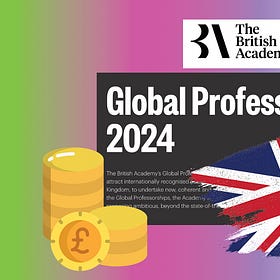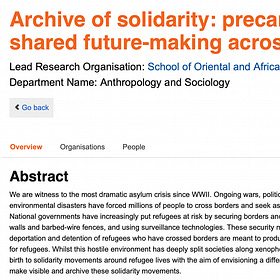The British Academy: a big black hole in the nation's finances
It received £274 million from taxpayers between 2019-23 - and has rewarded us with nonsense research
Remember Keir Starmer’s speech earlier this week? The one that said:
There’s a budget coming in October and it’s going to be painful. We have no other choice given the situation that we’re in.
Today I thought I’d show British taxpayers some of the “pain” being experienced at The British Academy, “the UK’s national academy for the humanities and social sciences”.
It receives an astonishing amount of money from taxpayers - £274,493,050 in total between 2019-23…
… I don’t suppose Labour will be reducing government funding, though. Essential services n all that! Everyone knows the UK desperately needs more doctors! (in Gender Studies and decolonising dinosaurs, right?)
Luckily the British Academy endlessly caters to the UK’s insatiable demand for academics in social sciences, humanities and the arts (“SHAPE”, as it calls it).
Earlier this month, for instance, it awarded over £15.9 million in Postdoctoral Fellowships to 45 “outstanding” souls whose projects include:
£370,589 - "Plant trees, save Lahore": afforestation as hope and political project in Pakistan
What does the act of planting a tree symbolise in Pakistan's postcolonial landscape? Who is included, and who excluded, by the project of 'greening' Lahore? What can afforestation tell us about the experience of living in climate crisis, and the futures that become (un)imaginable as a result?
£348,706 - At the Cold War’s Margins: New Theory of Indian Women's Pacifist Thought
This project will develop a new theory of Indian women's pacifist thought to make a timely and critical contribution to decolonising Cold War politics.
£305,108 - Bodies of Work: Pain, Perfection, and Disability in the World of Orchestral Music
This innovative project will undertake interviews and workshops with musicians identifying as physically disabled and interviews with non-disabled musicians and music gatekeepers (eg promoters and directors). The research will contribute to a reimagining of disability theories originally used in visual arts to better understand the relationship between normative attitudes and practices and disabled access in orchestral music.
£371,073: How does for-profit outsourcing impact healthcare quality? Unpacking the relationship between NHS privatisation and health outcomes in England.
This project will ultimately answer how is privatisation impacting quality of care and who is benefitting/suffering as a result. England’s NHS, like many public health services around the world, is being slowly privatised – understanding how this is impacting health outcomes is integral if we are to protect the quality of care provided
£328,992: Rethinking professional identity commitments: caring, creativity, and collective action
This research will examine the relationship between professional identity commitments and propensity to industrial action for workers in the caring and creative industries. Those who view their work as a ‘calling’ are typically committed to the goods of those roles, such as patient care or artistic excellence, which are generally presumed to be incompatible with immoderate behaviours such as striking.
on and on it goes… (full list here).
Think I’m done yet?
*Incidentally, I’m starting to think my readers may need their own “trigger warning” ahead of rage-inducing content. Maybe a “whiskey warning” - aka grab yourself a little drink/ whatever takes the edge off.
WHISKEY WARNING!
A very “Global Britain”
For a body that has “British” in its name, The British Academy sure likes spending our money on “international” projects.
Take its “Global Professorships” scheme (£7.2 million in total up for grabs) where candidates are offered up to £900k each, as well as “childcare support” and the ability to work in their “home institution overseas”. More here:
The British Academy's £900k "Global Professorships" (paid for by YOU, the British taxpayer)
During my Woke Waste trawls, something has become very clear. The British taxpayer is funding A LOT of international students.
Then on Wednesday this week, the British Academy “announced over £2.8 million in funding for 12 outstanding SHAPE early career researchers from across the globe, enabling them to establish and conduct their research at a UK institution of their choice.”
It continued:
The two-year Fellowships provide early career researchers with the opportunity to acquire and transfer new skills and knowledge, and to encourage long-term relationships through networking opportunities and the International Fellowships alumni programme.
Let’s take a look at another set of “outstanding” projects; we truly are spoilt! A sample of three, mind you (don’t want to over-indulge on brilliance):
£196,350: From queer ecology towards haunted aiesthesis: disorientation, care and futurities in the LGBTQIAPN+ artists' moving image from the Brazilian Amazon.
This research aims to analyse the strategies used by LGBTQIAPN+ Indigenous and non-Indigenous moving image artists from the Brazilian Amazon to imagine queer ecological futures for the Amazon. In the current environmental crisis, queer ecology scholars suggest that we must learn from queer modes of conviviality to overcome contemporary ecological issues. Despite limited forays, recent literature on queer ecology also indicates the inevitability of expanding itself to the discussions on genders and sexualities from the Global South to decolonise the discipline.
£202,318: Navigating Amphibious Lives: Women, race and environments in Colombia, c. 1750-1850
This project examines the environmental, social, and commercial lives of the Magdalena River, a fluvial network that runs along present-day Colombia from the Andean Mountain range to the Caribbean Sea. To do so, the project centres the experiences of free women of colour (a colonial category meant to classify subordinated groups like afroindigenous, afrodescendants, free Africans). Set between 1750-1850, this research threads how free women of colour exercised economic and social influence on riverine societies, thanks to their high degree of mobility grounded in their own exercise of amphibious culture, a culture equally dependent on land and water. In this way, free women of colour challenged local governmentality and spatial configurations. This project’s impact lies at the explicit connections it will draw between historical understandings of amphibious culture and its relationship to current plights for racial and environmental justice.
£243,090: The Magic of Rock Art: An Ethnoarchaeological Study of Art across Media in Papua New Guinea
Papua New Guinea (PNG) is host to the highest biological and cultural diversity on the planet with over 800 distinctive languages, societies and art traditions in a territory only twice the size of Britain. Despite this exceptional diversity, we have no idea how these diverse art forms emerged in deep time, what they signified for people in the past, and what it meant to transpose designs across a wide range of media. One way to explore these topics is to examine rock art.
Very useful stuff…
I don’t mean to detract from all this “outstanding” talent but did anyone else spot the recent news that homelessness is at its HIGHEST level in England since records began?
Just under 113,000 households, including almost 146,000 children, were living in temporary accommodation in the third quarter of last year, at a cost of £1.6bn, up from 83,540 in 2018, a rise of 35%. (link here)
Forgive me for asking - as I know adding & subtracting is the fastest way to be called “Far Right” (after sending a tweet) - but where will these additional people will go?
Or perhaps a better question is where Brits will go? When house prices rise, due to increased demand, and they find themselves bidding with international talent (subsidised with British taxpayers’ money)?
Ah well! Best not to give it too much thought. Leave the big stuff to the queer ecology lot…
Be the first to receive exclusive content via paid subscription.
Woke Waste is a mighty project. Every article is the culmination of huge amounts of reading and admin behind the scenes, pretty much seven days a week! For £5 per month/ £50 per year I do think you get real bang for your buck (in addition to there being a lot of free posts). Almost everything is an exclusive and packed with information. You're also contributing to a wider mission. Woke Waste is more than a journalistic project for me. It’s my little fight for Britain. We are in trouble, and part of the problem is we don’t even know what we’re up against! My goal is to “De-Blobify The Blob”, so it can ultimately be defeated. Every piece is eventually designed to fit together as part of a wider structure - which I’ll be able to show more of as my research develops. Upgrade to support Woke Waste and Defeat the Blob!
PS. Thanks to all paid subscribers and all readers for your support so far.
—
More content:
PAID: 10 of the most WTF PhDs - funded by the Arts and Humanities Research Council
Support Woke Waste, Defeat the Blob!
PAID EXCLUSIVE: How university grants quietly fuel Britain’s border crisis
Support Woke Waste, Defeat the Blob!






